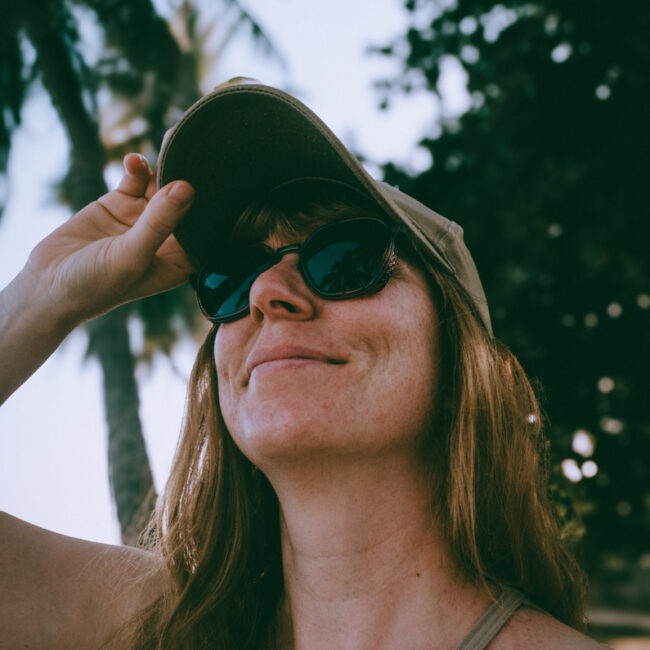

Exploring Muang Ngoi Neua in Laos is a truly unforgettable experience. From beautiful waterfalls to enchanting caves, there is so much to discover in and around this small and tranquil town. In this guide, I will tell you all about the sights, activities, and accommodations that this area has to offer and come away with a plan for the perfect trip. Beware though. Muang Ngoi is a small town in a rural area. As a conscious traveler, there are a few things to take into account before you go.
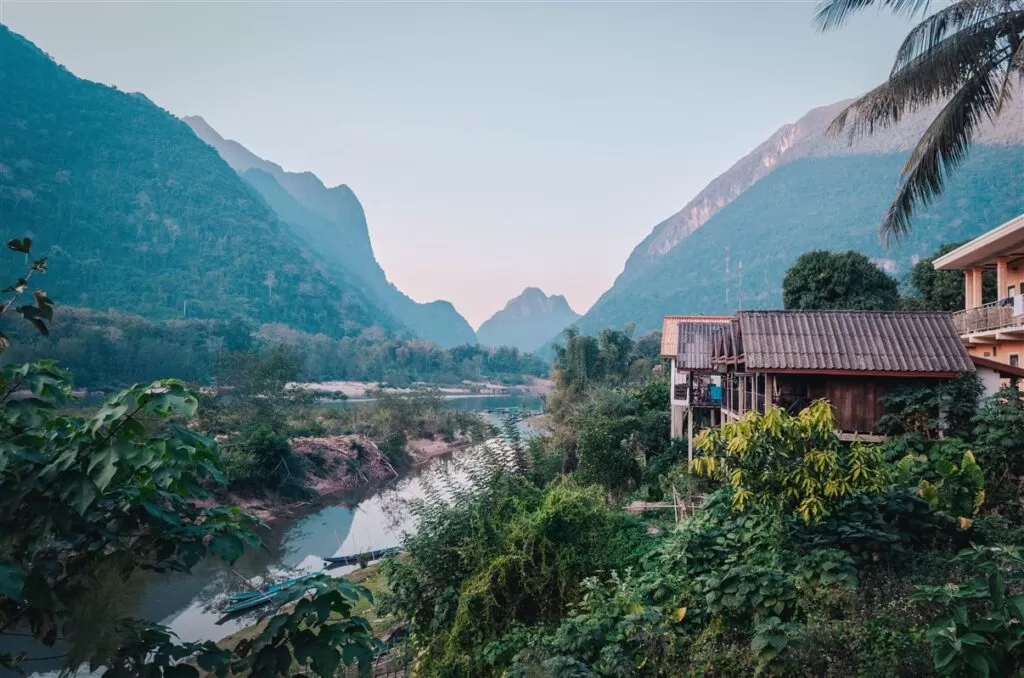
Muang Ngoi, Laos
Muang Ngoi is a beautiful town in the north of Laos. It has some sort of magical status in the backpacker world, mainly due to the fact that it is only accessible by a one-hour boat ride on the Nam Ou river ride from nearby Nong Khiaw.
Muang Ngoi is indeed lovely located, in a peaceful valley between lush green mountains and fertile valleys. Chickens and dogs run up and down the street, which is still not paved but a red gravel dirty path. People go about their day in a calm and quirky way and the fact that cars and motorbikes are practically non-existent only adds to the charm.
There is plenty to do in and around Muang Ngoi, mainly sights and attractions of the natural sort. However, there were a few things I felt a little uncomfortable with at the time of my visit and I think you, as a conscious traveler, should know this before you decide to visit this captivating region.
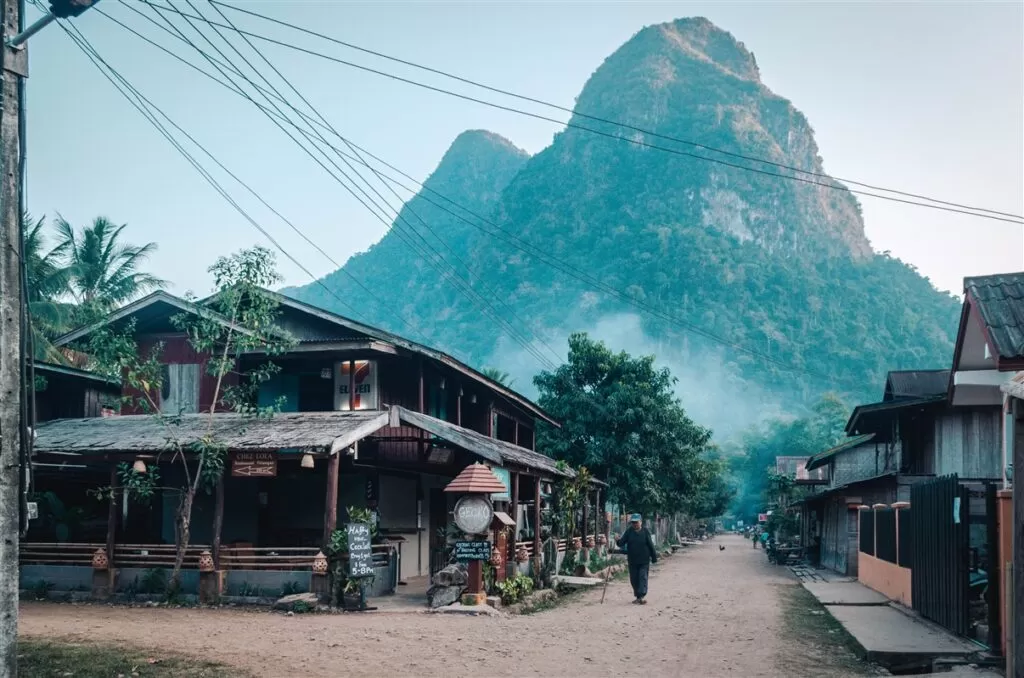
The main street of Muang Ngoi Neua, Laos
Muang Ngoi is a lovely town but it is a conscious travel destination? Yes and No. While the location and feel of this town are absolutely lovely, during my visit I had a few concerns about how tourism was organized.
Muang Ngoi is a small town with only a dozen accommodations. At the time of my visit, it was hard to find a room available so I ended up staying at a place I didn’t really feel comfortable with.
There are indications that this small town will not be able to swallow the large amounts of tourists that will probably show up in the future. Muang Ngoi is starting to get a well-known status on the banana pancake trail and it felt like the locals don’t know how to deal with that in a sustainable way.
Upon arrival with the boat, the villagers are waiting at the boat landing to welcome you, or at least it seems like that. In fact, these people are a few guesthouse owners who try to convince newly arrived tourists to stay at their accommodations. Some were particularly annoying.
I was set to stay at a very local accommodation away from the main road but unfortunately, it was fully booked so I ended up staying with a local woman who seemed to be the boss of the town.
She told me she was married to a Western man and was bragging about how they owned four of the accommodations in Muang Ngoi. Taking into account that this is about one-third of all the guesthouses in Muang Ngoi, that’s a lot.
After she closed the deal I had some questions for her. But when I contacted her through WhatsApp, she simply didn’t reply anymore. She and her husband also own a backpacker restaurant on the other end of the main street. So there’s no one near the accommodation if you have a quick question.
They organize a breakfast buffet every morning at the restaurant. I have heard a horrible story about another local lady who wanted to do her own version of a buffet and got threatened by her. It’s pretty clear to me that she is very money-orientated and wants to control the town.
If you want to visit Muang Ngoi, my advice is to not stay at the accommodation of the couple I just mentioned above. The attitude of the woman is completely wrong. Spend your money elsewhere at a guesthouse with hosts that truly care about their guests. At the end of this post, I will give some good tips for local accommodations and restaurants!
In addition, I couldn’t help but feel that the atmosphere in town is a bit grim. I’m not sure if the couple I mentioned above has anything to do with it.
It’s possible that the locals blame the rise of tourism for destroying their peaceful town. While Laotions are very friendly and hospitable in general, it was hard to get a friendly word out of them. Hellos I gave to locals on the street remained unanswered which left me with a rather sad and unpleasant feeling that I wasn’t really wanted there as a tourist.
I don’t think a lot of locals actually benefit from the tourists visiting their town, only a few.
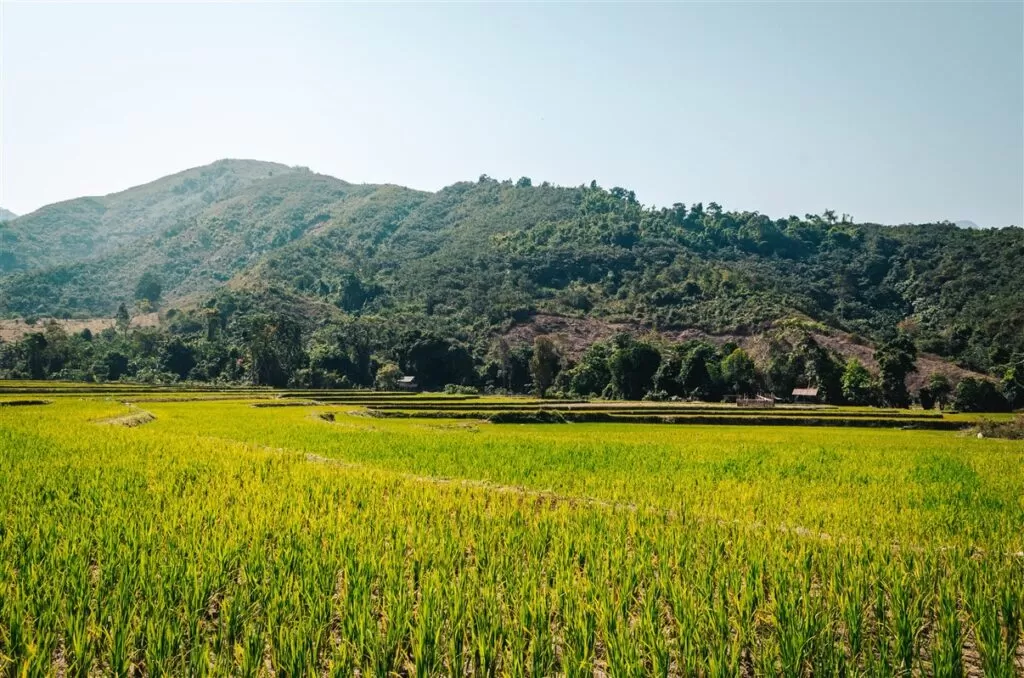
Rice fields near Muang Ngoi, Laos
That being said, on the other hand, is Muang Ngoi a wonderful town and absolutely worth a visit.
The region around Muang Ngoi is of outstanding beauty and, while it might seem tempting to laze your days away here in a hammock overlooking the river, it’s worth it to go out and explore.
Here are the best things to in and around Muang Ngoi!
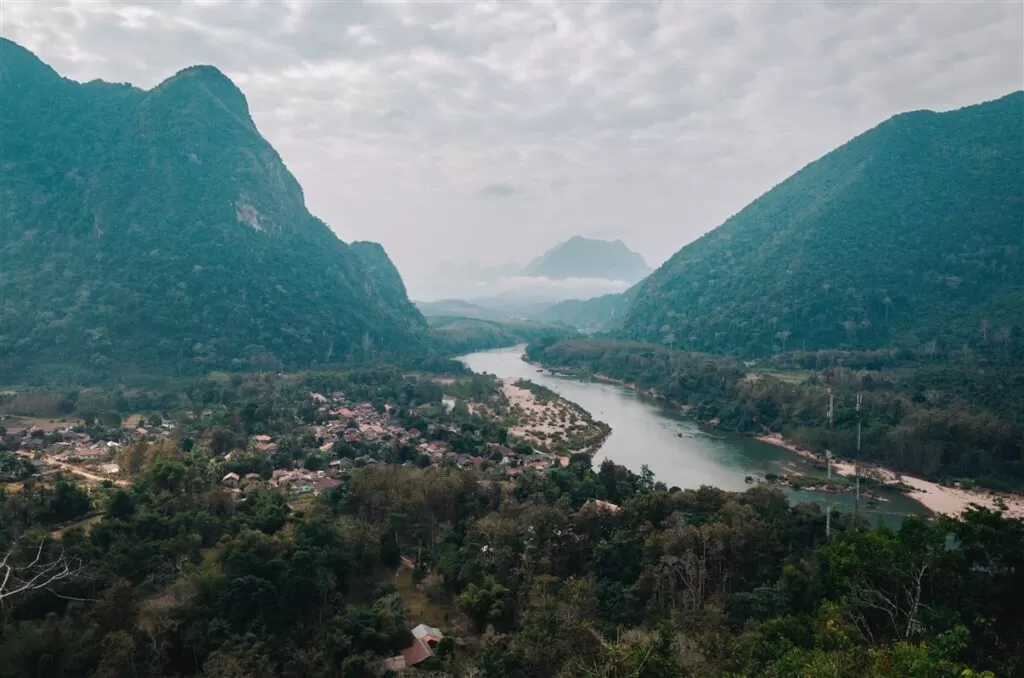
Phanoi viewpoint, Muang Ngoi, Laos
Just like Pha daeng Peak and others in nearby Nong Khiaw, Muang Ngoi also has its mountains on which you can hike to incredible viewpoints.
Phanoi viewpoint is a viewpoint that you can find on the right-hand side of town while facing the river. The entrance cost is 20 000 kip/pp and it also includes a visit to a wonderful cave (see below).
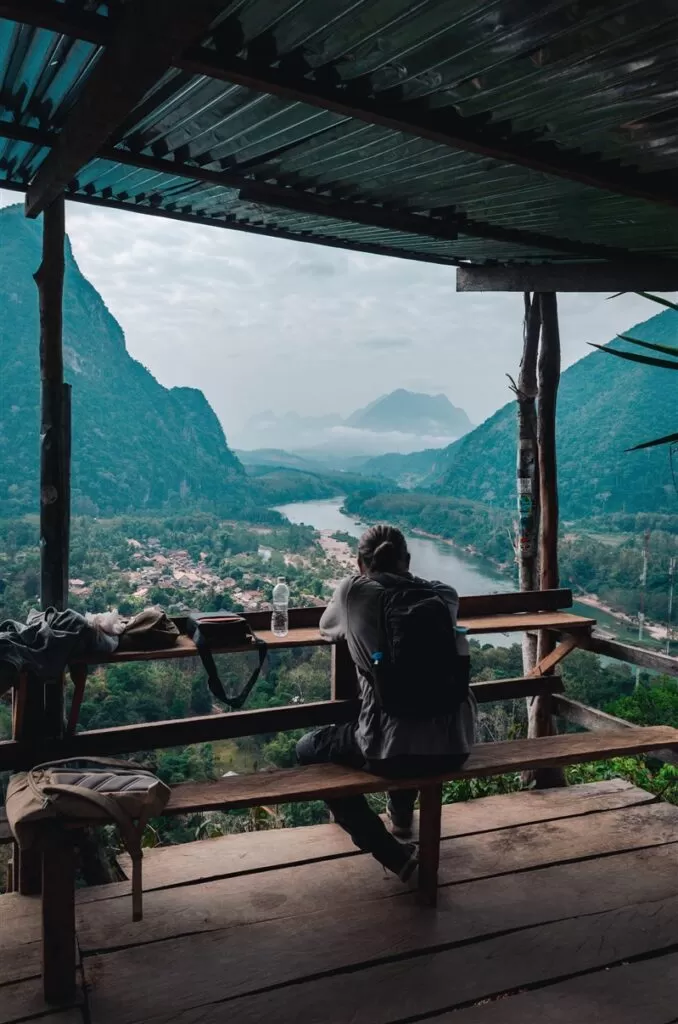
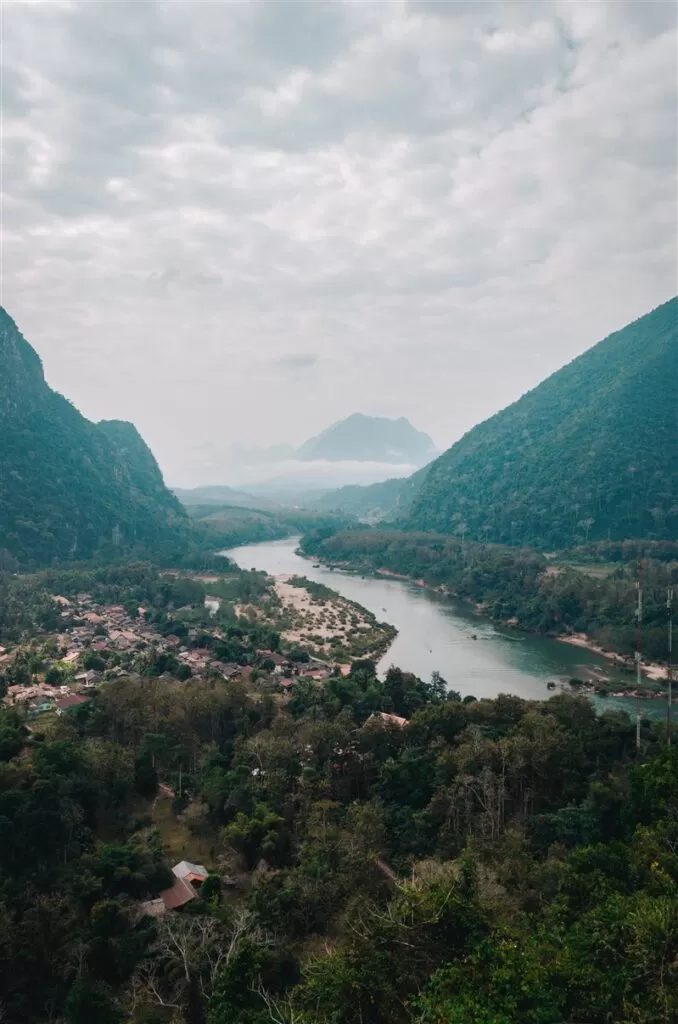
Phanoi viewpoint (Muang Ngoi viewpoint)
The walk up the mountain is a little challenging but can be done in half an hour. At the top, you can soak in the views from a lovely constructed platform that lends itself well to a picnic.
There are actually three viewpoints in Muang Ngoi. This viewpoint is called Phanoi viewpoint I. Next to it is another viewpoint called Phanoi viewpoint II. On the other side of the town is another viewpoint called the Pha Boom viewpoint.
On the way up to Phanoi viewpoint you will pass by the entrance of a cave. The cave is lovely and was used by the Pathet Lao as a shelter during The Laotian Civil War. A lot of travelers are well aware of the horrors of the Vietnam war but the terror that happened in Laos is little known.
On the bench next to the entrance, you can find headlamps provided by the guy in charge. You will need them since the cave is a 200-meter-long corridor that goes all the way into the mountain. Alternatively, you can bring your own flashlight or a cellphone flashlight will be sufficient too.
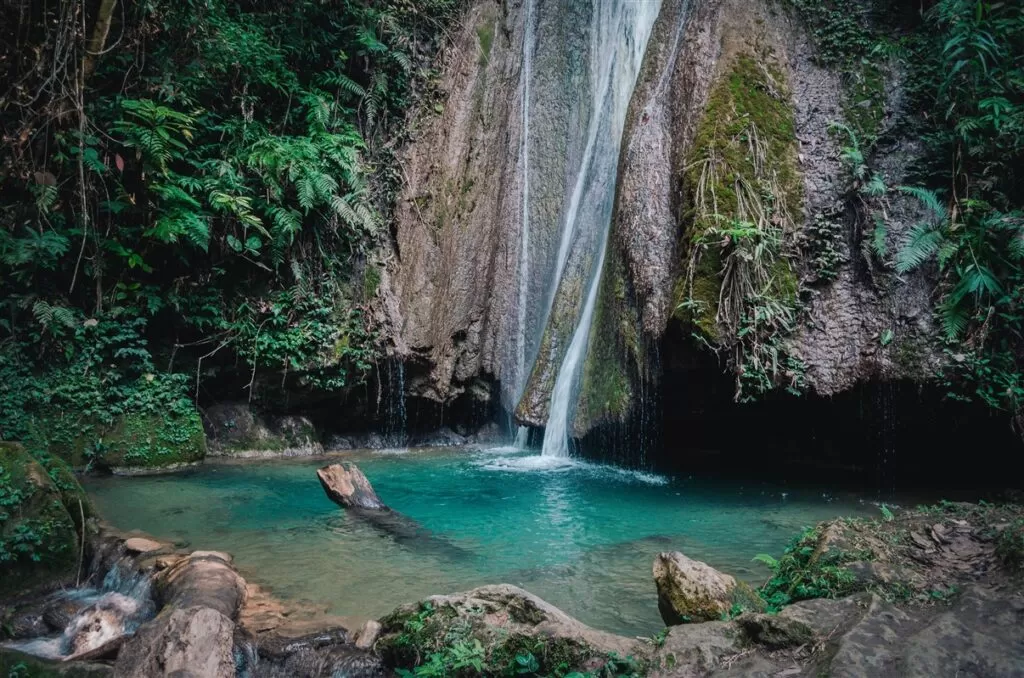
Tad Mook waterfall, Laos
Tad Mook is a lovely waterfall that you can reach by doing a 10-kilometer hike from Muang Ngoi. While not as impressive as the waterfalls near Luang Prabang like Kuang Si Falls and Tat Sae Falls, Tad Mook charms with its bright blue water and off-the-beaten-path location.
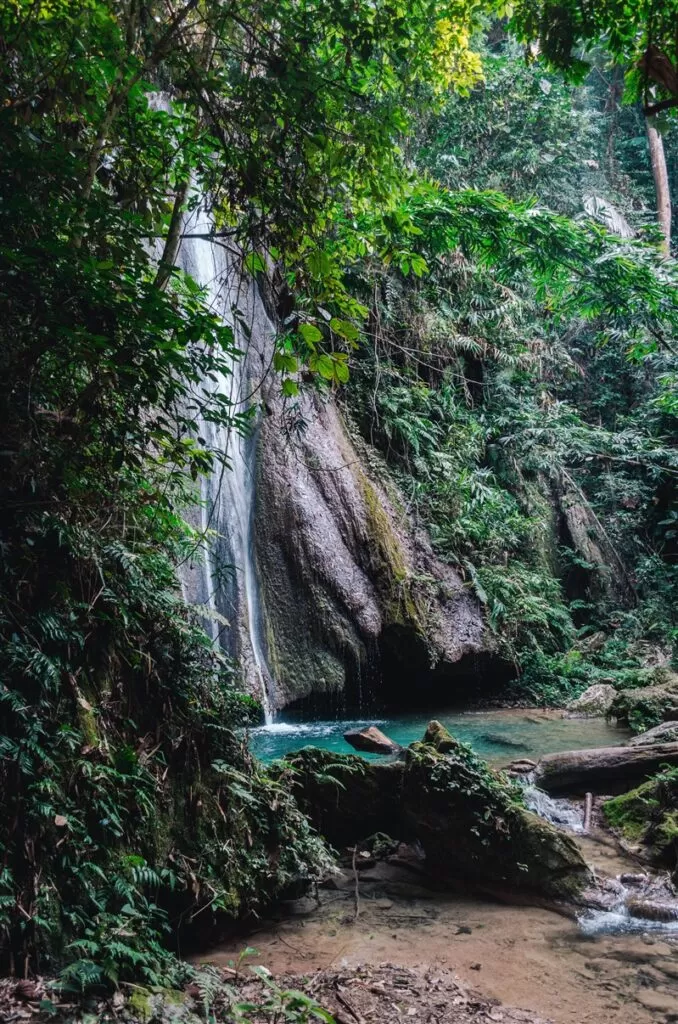
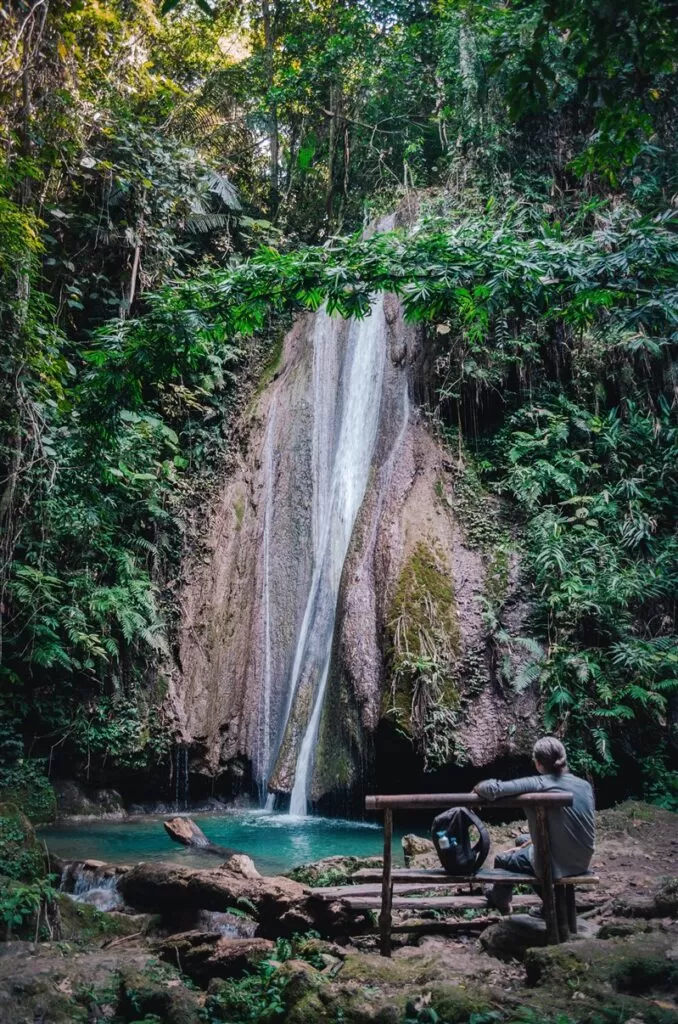
Tad Mook waterfall, Laos
Tad Mook is located near the town of Sop Kong and is a highlight on tours that leave from Nong Khiaw. It is however also possible to visit this waterfall on your own.
Locals and travel guidebooks say that Muang Ngoi is only accessible by boat but this is actually not true. There is a road that leads all the way from Nong Khiaw to Muang Ngoi, next to the river. It is not visible in Google Maps but you can see it Maps.me.
Using Maps. me you can perfectly find the directions to this beautiful waterfall with crystal-clear water and a wonderful blue-green color. The entrance is located two kilometers before you reach the waterfall and the price of a ticket is 10 000kip/pp.
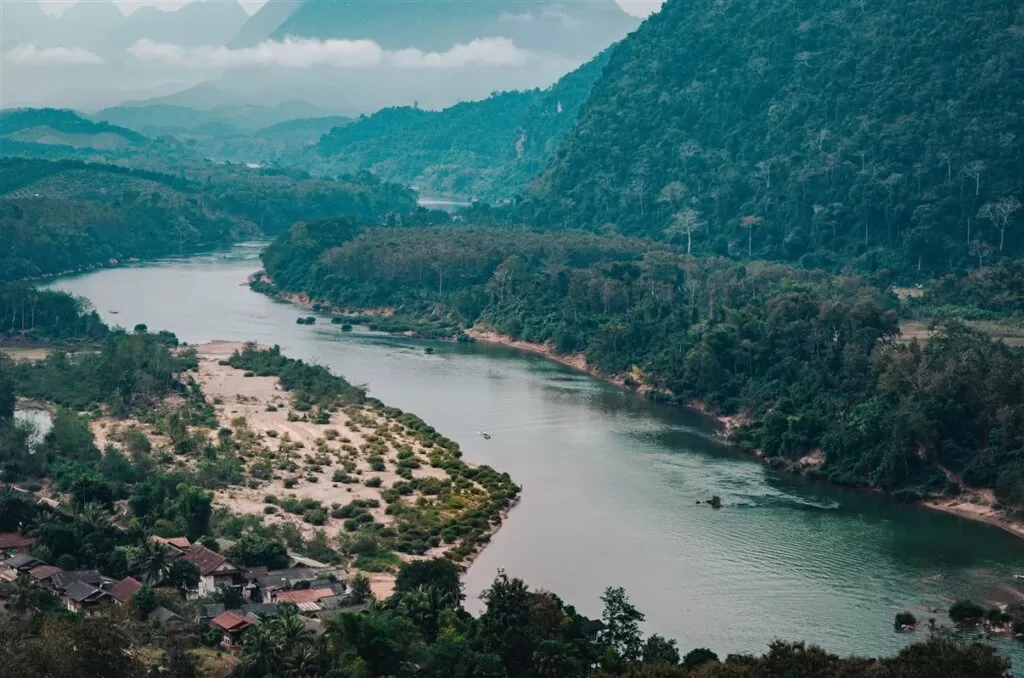
Nam Ou beaches, Laos
Nam Ou beach is not an official beach but rather a name for all the large stretches of sand that you can find on the banks of the Nam Ou River. They are great places to do a picnic and go for a swim in the river.
There is one large patch of sand near the town of Muang Ngoi but there are more of them if you take a boat or kayak upstream.
If you go for a swim, do note that the current of the river can be very strong.
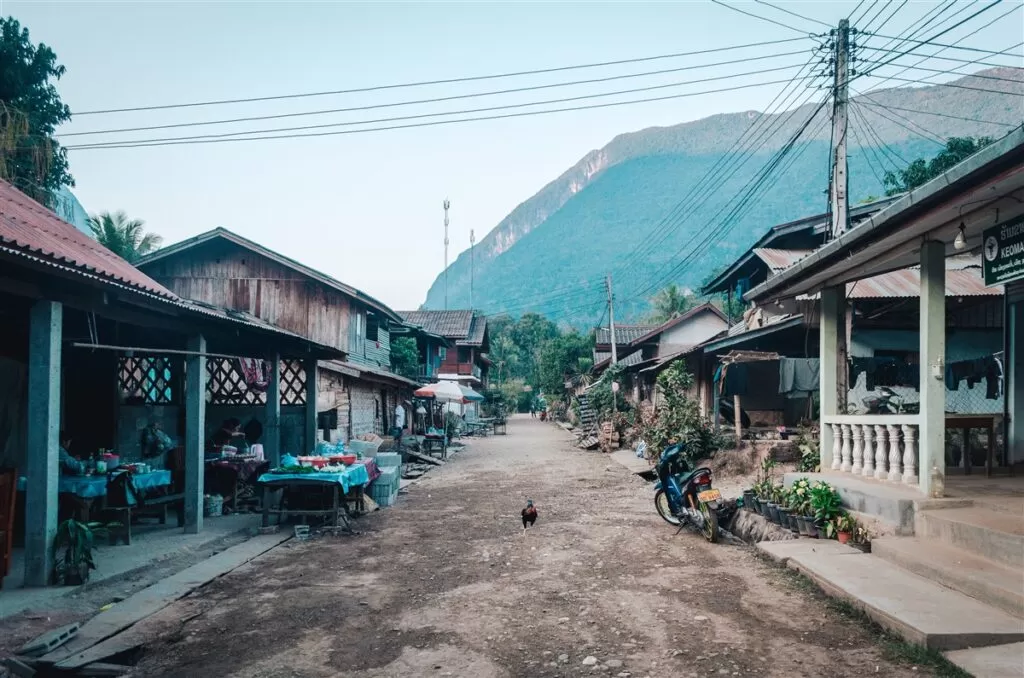
Seng Phet restaurant (on the left)
If you only have time to try one restaurant in Muang Ngoi, then go to Seng Phet. It might not look like the coziest option at first but you will find the best food in town here.
In the morning you can try the delicious deep-fried doughnut balls with banana, coconut or potato after ordering a delicious noodle soup for breakfast for only 15 000 kips.
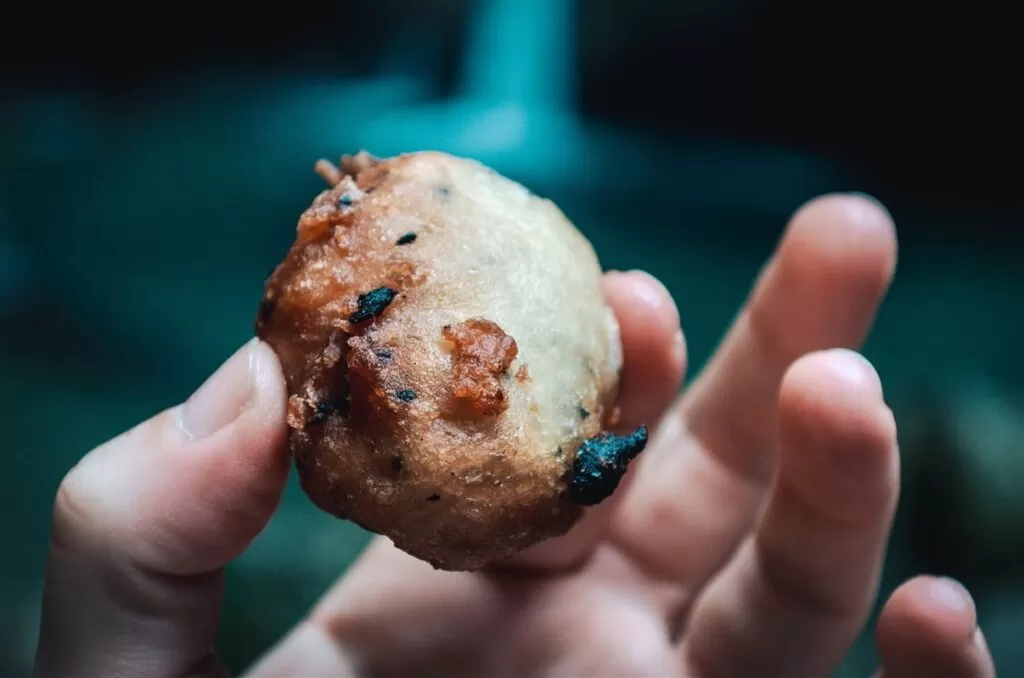
Fried dough with banana, coconut or potato inside from Seng Phet
The food here does not only taste great but it’s also a very local place that is not really focused on tourists although they do provide an English menu.
It is operated by a mother-daughter duo that takes great care of their guests and, compared to some other restaurant holders in town, with a genuine friendliness.
In the morning, it’s also a delight to see them cook dishes like fried seaweed and steamed rice over an open fire.
The Suzy vegetable soup is a local coconut soup and a must-try for vegan travelers in Laos!
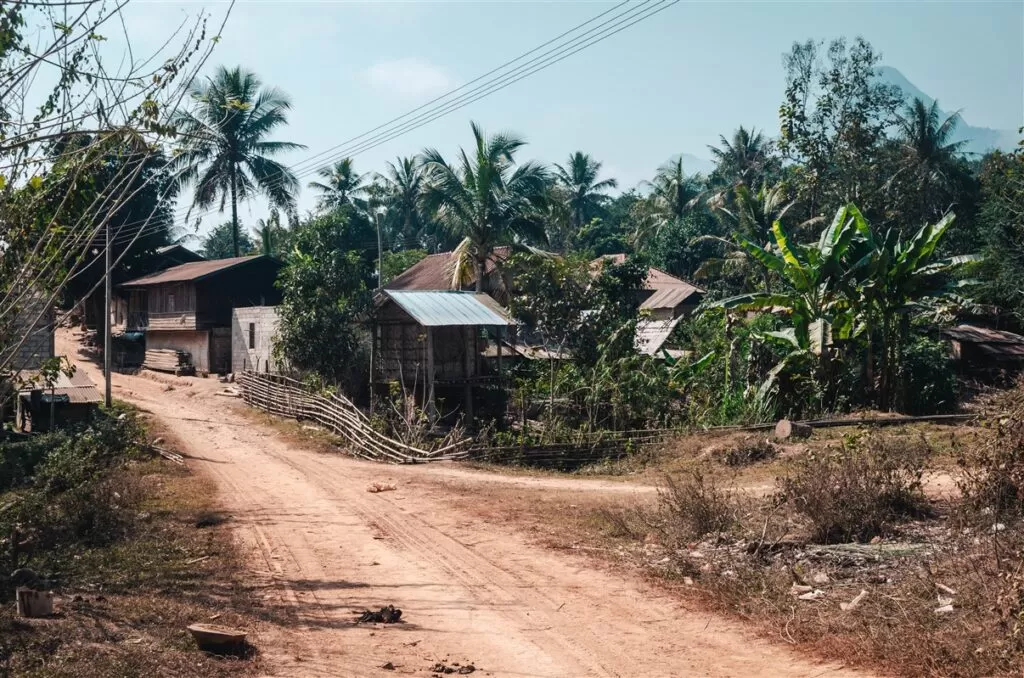
Ban Hatchan village, Laos
There are multiple local villages in the area around Muang Ngoi where you can experience local Lao life. Do be aware that the locals are not that open toward tourists but will rather look away and only say “Hello” if you initiate contact yourself.
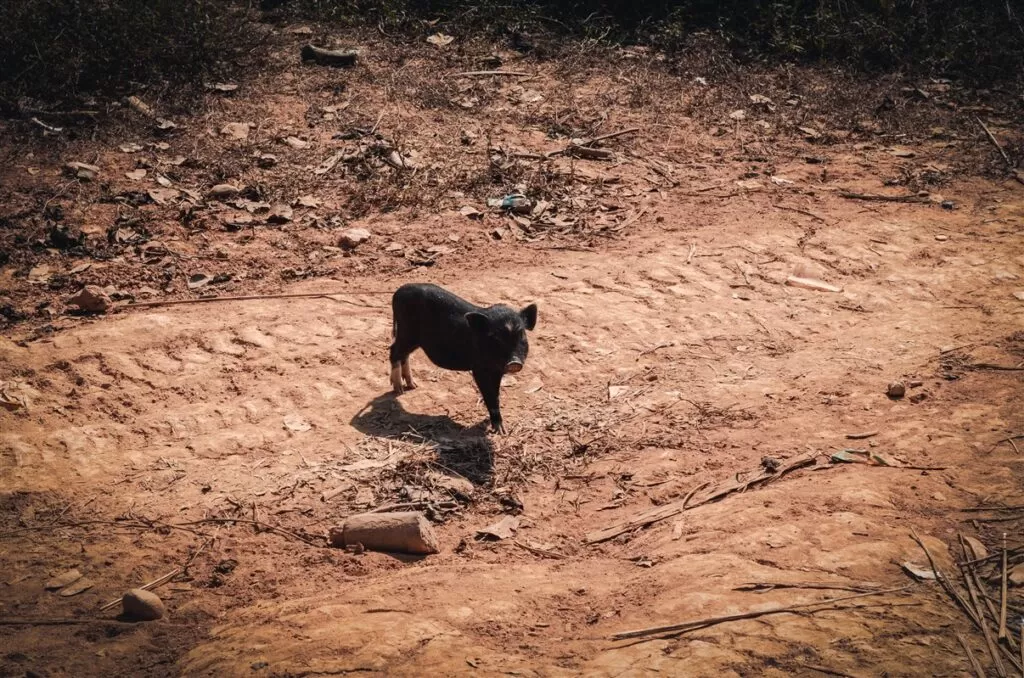
Little pig on the road
Ban Hatchan and Sop Kong are villages you can visit on the way to Tad Mook Waterfall. There are more villages to explore in the direction of Tham Kang cave (Ban Na, Huay Sen, and Huay Bo) but you will need to pay 10 000 kips admission fee at Tham Kang cave to cross a bridge.
This is a bit of a scam and it’s up to you to decide if it’s fair to pay for this. I didn’t do it, because the lady was not polite and there are other villages to explore in the area for which you don’t need to pay.
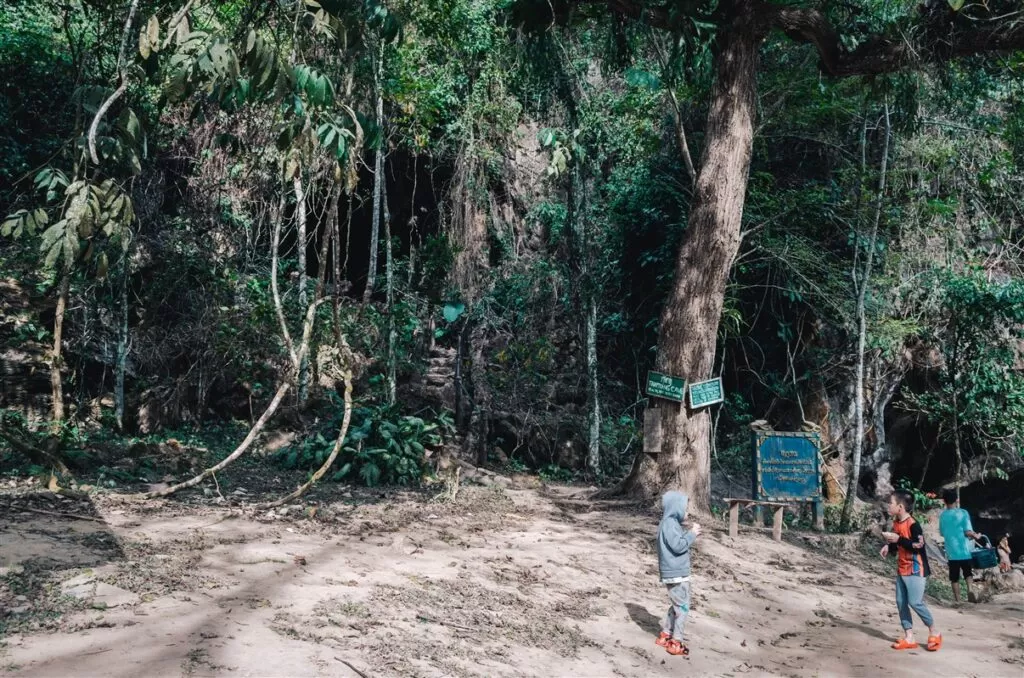
Tham Kang cave, Muang Ngoy Laos
Tham Kang cave is a small cave around two and a half kilometers from Muang Ngoi. It features only one room with next to it a natural pool. The cave itself is nothing special but the story behind it is.
It was the hiding place for 600 locals living in the area during the Lao Civil War. Whenever their towns were under attack, the villagers would flee to the cave and wait until the bombardments had passed. The entrance to the cave is 20 000 kips.
There’s also a third cave in Muang Ngoi, called Pha Kaew cave but I didn’t visit that one.
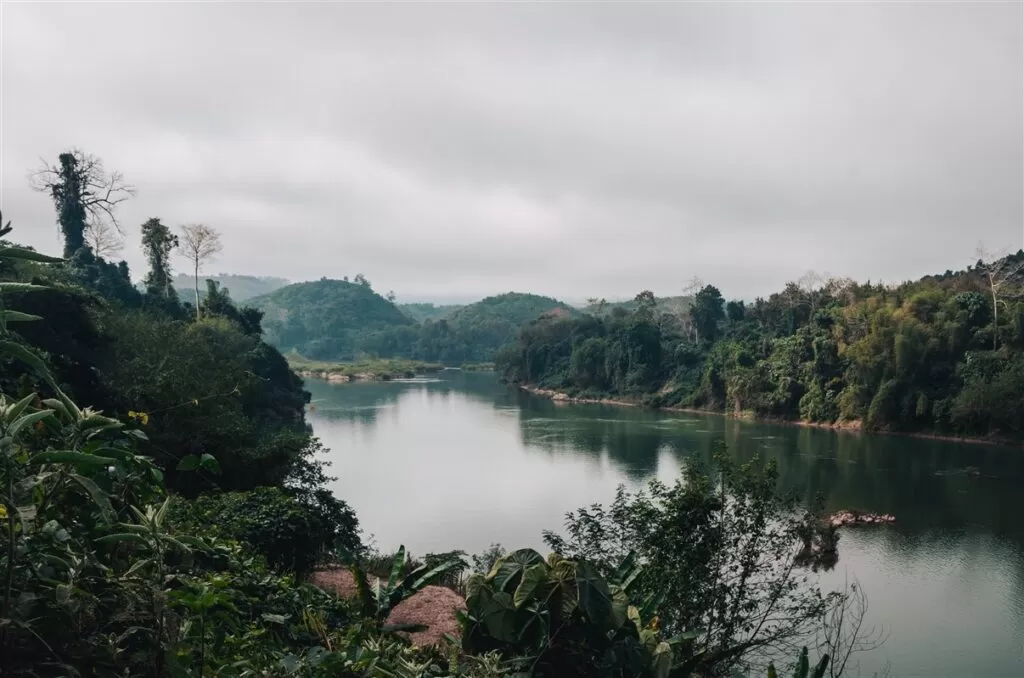
Nam Ou river
Hiking is one of the main things to do in Muang Ngoi. The main hiking opportunities involve the viewpoints around the town center and the villages in the directions of Tham Kang cave and Tad Mook waterfall.
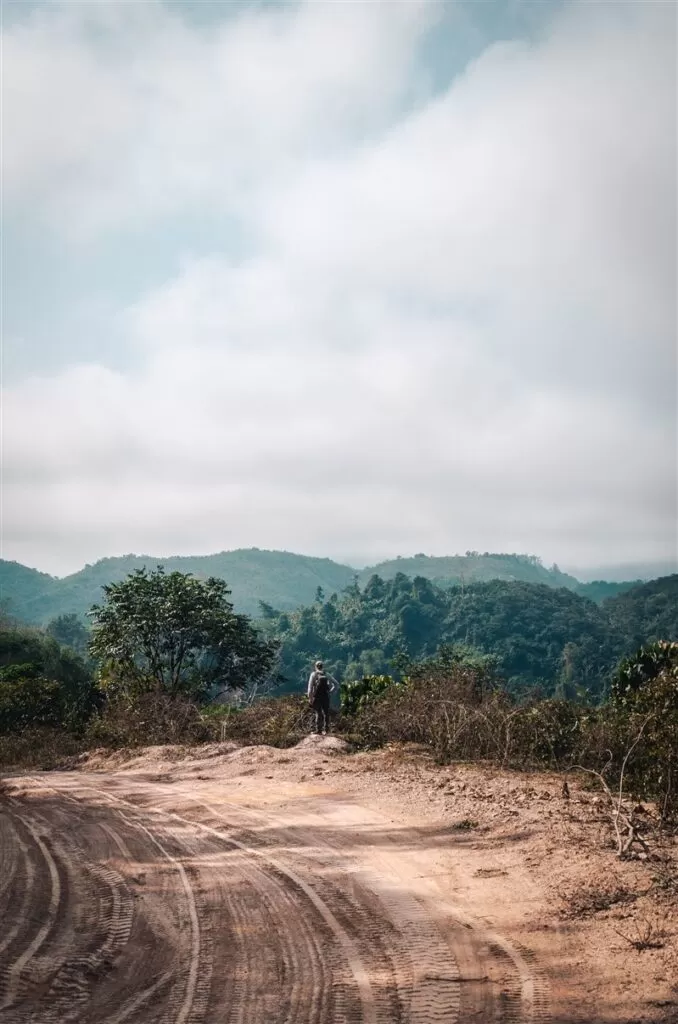
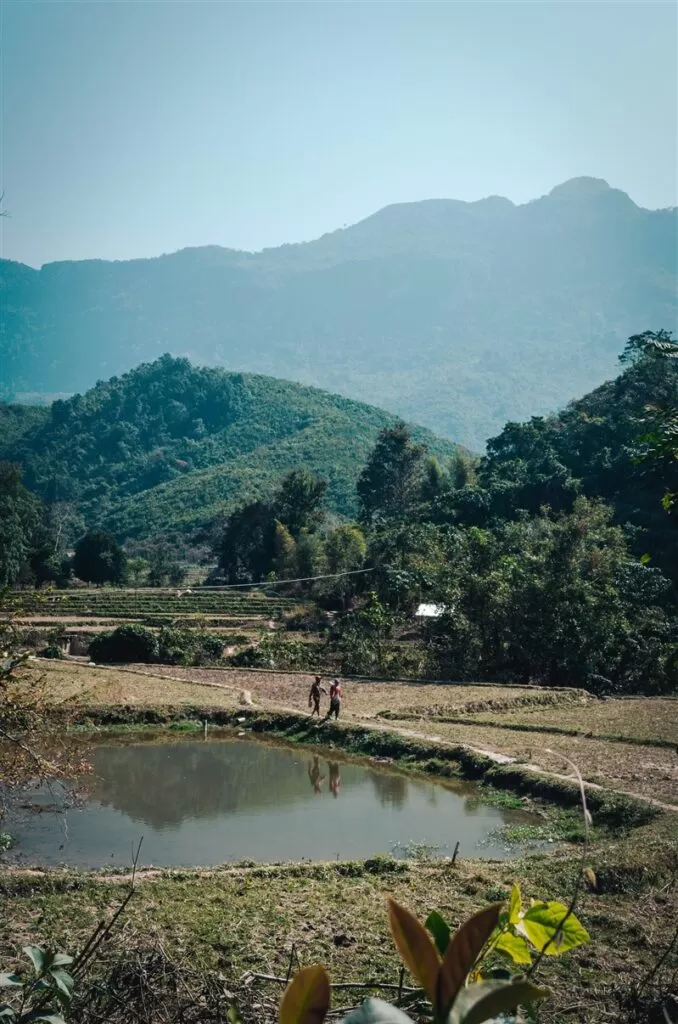
Hiking around Muang Ngoi
The roads are mainly red dust roads that lead from one village to the other. One area, however, is very scenic. It’s the road that leads from Sop Kong village to Tad Mook waterfall. These small pathways take you through rice plantations and past small rivers until you finally reach Tad Mook.
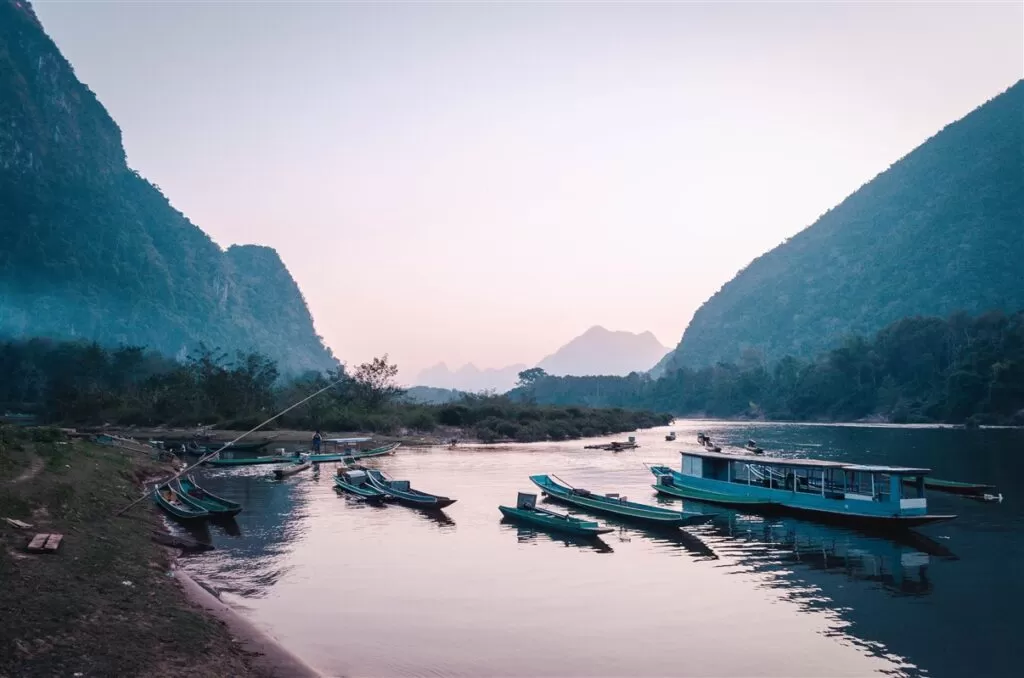
Views of the Nam Ou river
Most of the accommodations in Muang Ngoi offer accommodation with a river view and a terrace with a hammock. Lazing away the evening in a hammock with a Lao beer is the best way to end the day after some strenuous uphill hiking to the viewpoints.
On the right-hand side of the village when facing the river, you can find a small but well-kept Buddhist temple. The temple is not as impressive as some other temples in Southeast Asia but it provides a nice decor for a leisurely stroll, especially with the lush mountains as a background.
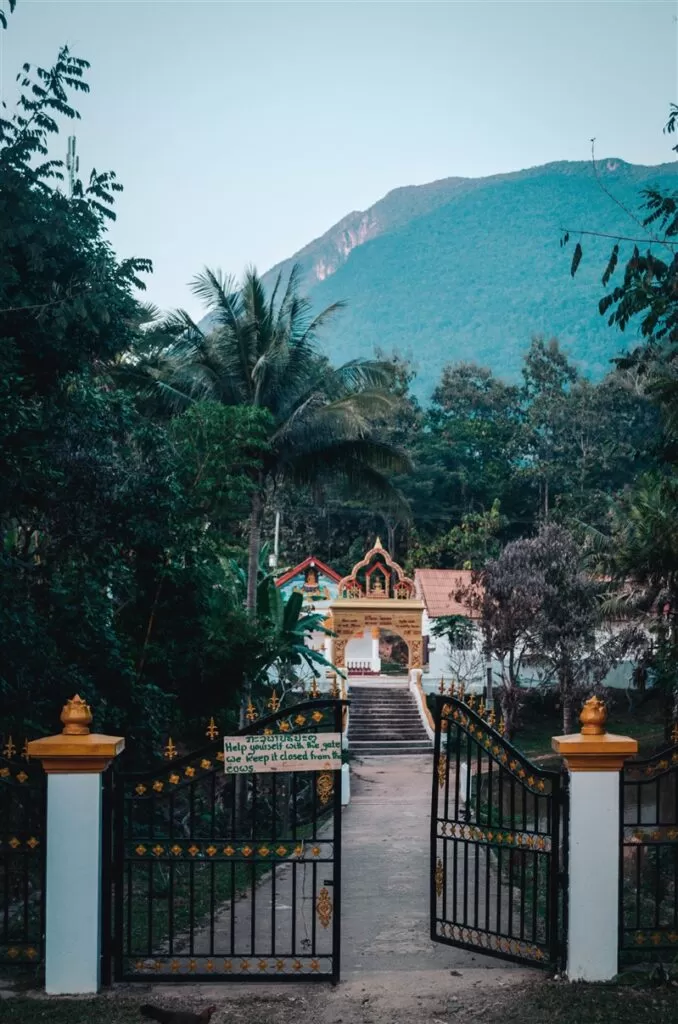
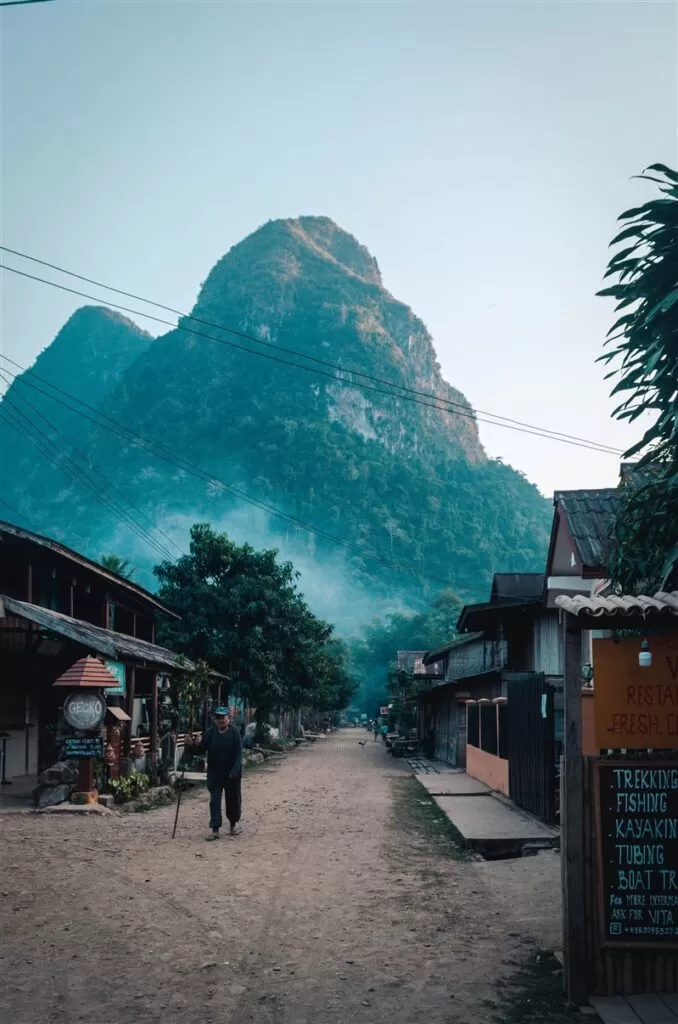
The local temple of Muang Ngoi
I was lucky enough to witness a traditional ceremony at the temple on the last day of my trip. It consisted of a big parade in which the majority of the locals participated to give honors to Buddha for Buddha day.
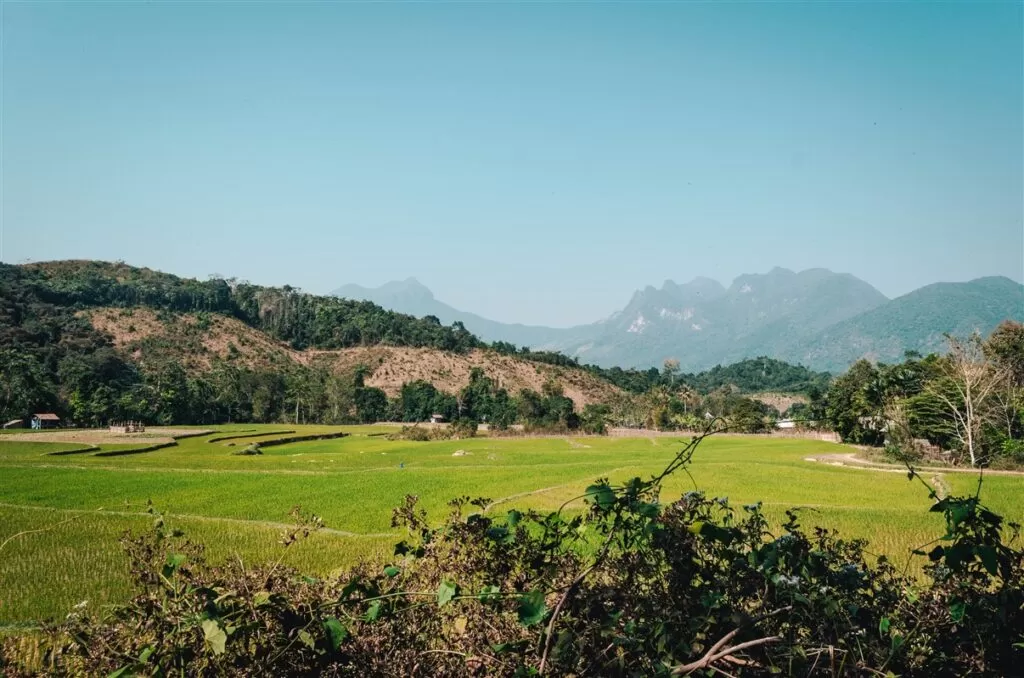
Rice terraces in Sop Kong village
If you want to delve deep in the local Lao culture and agritourism then visiting Yensabai Organic Farm comes in highly recommended. Located on the way to Tad Mook waterfall, hidden between beautiful rice fields, this farm focuses on sustainable living in all its forms.
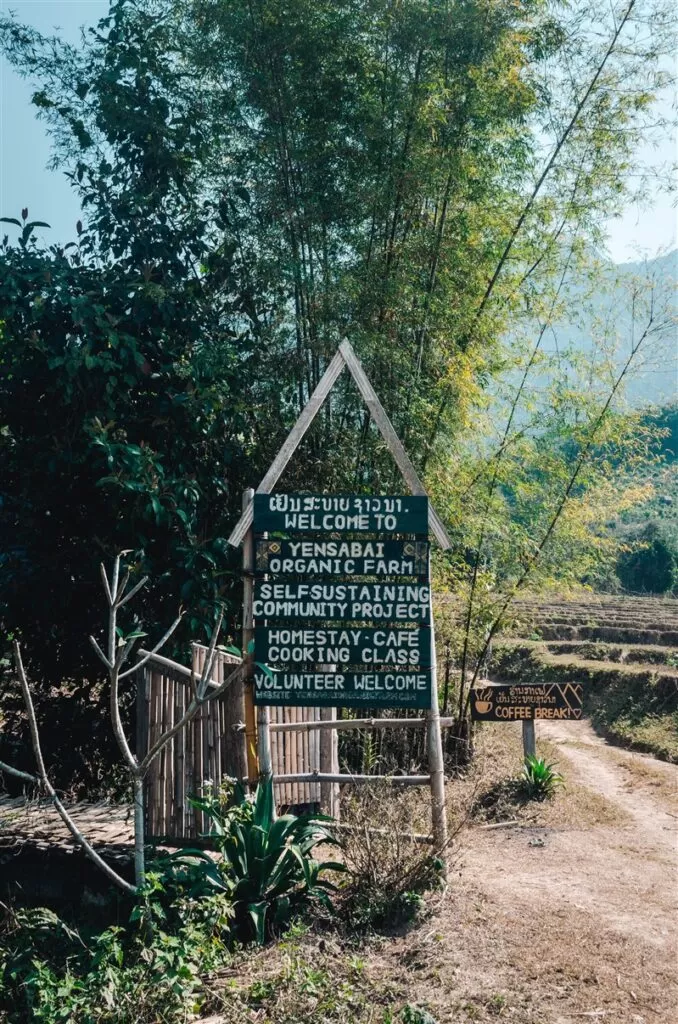
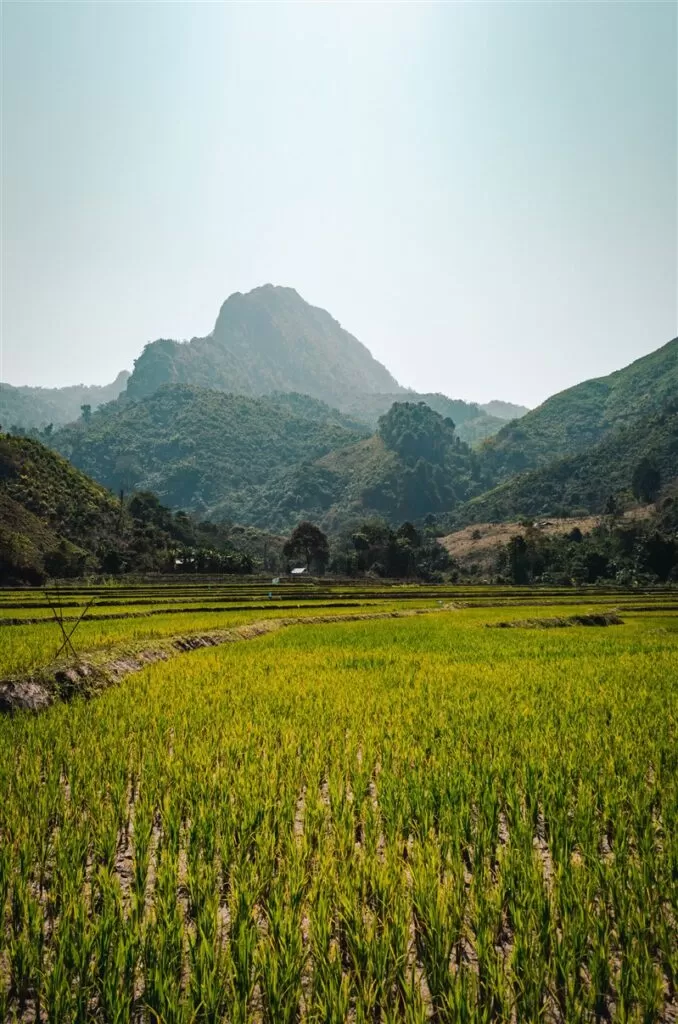
Yensabai organic farm
Travelers who want to visit Yensabai farm can participate in a variety of ways. You can just pop in for a coffee after visiting Tad Mook at the café but also contribute as a volunteer, sleep at the farm or camping site, or take a cooking class.
They donate 5% of their profits to the local community of Sop Kong. you can find more info on the website of Yensabai Organic Farm.
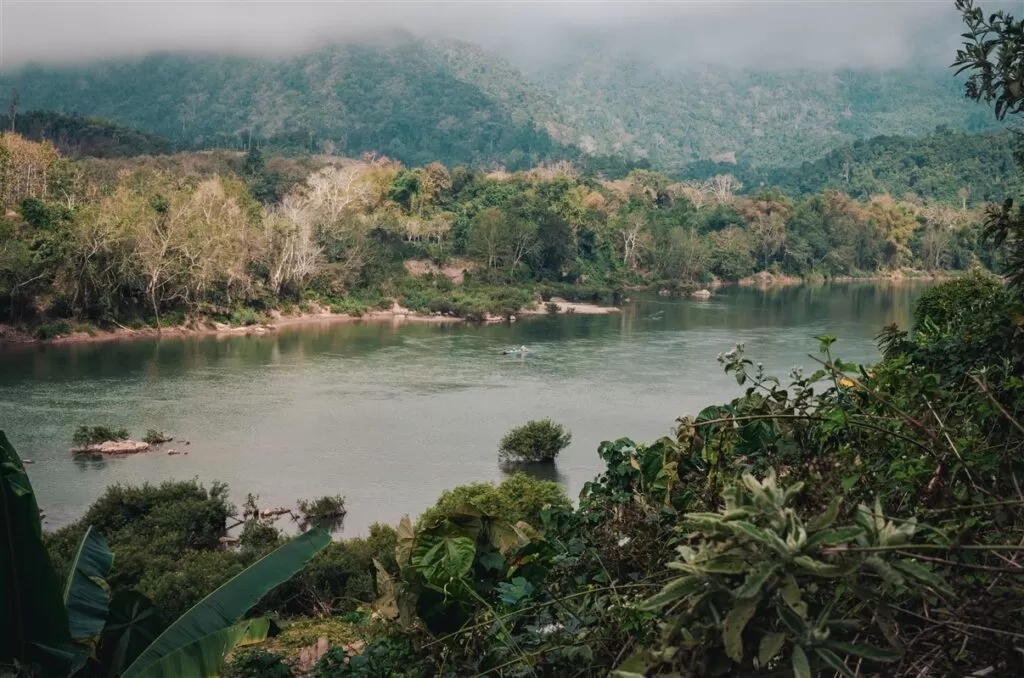
Kayaking on the Nam Ou river in Laos
If you want to hit the river then kayaks can be rented in the town near the Lattanavongsa guesthouse. Ask around for prices because Lattanavongsa charged 100 000 kips for a half day but at this sign a little further up the road they only charge 70 000 kips.
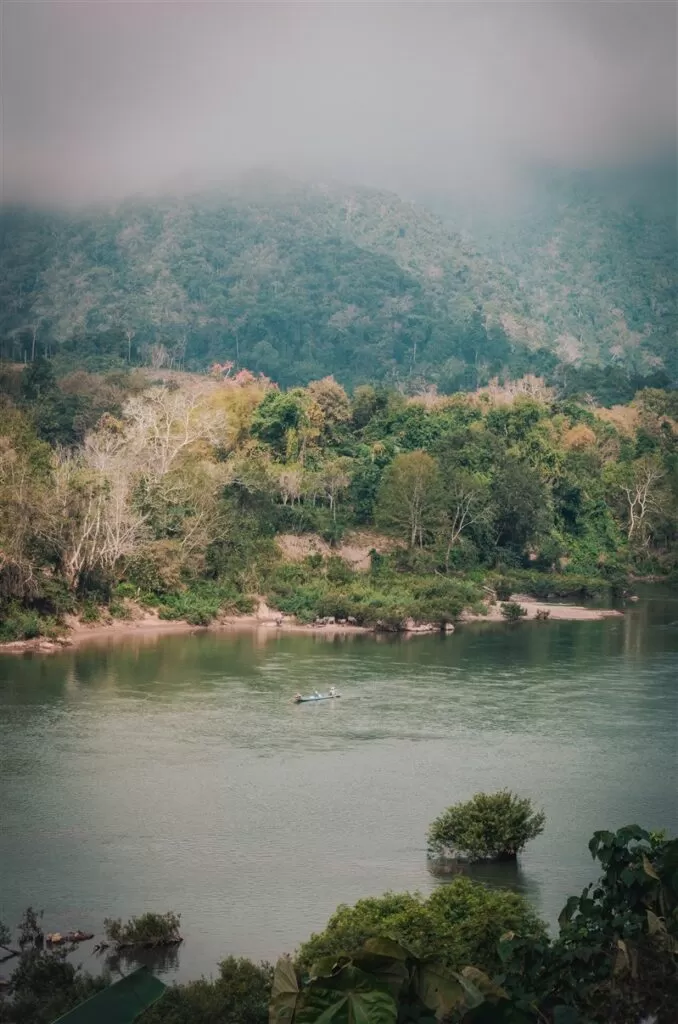
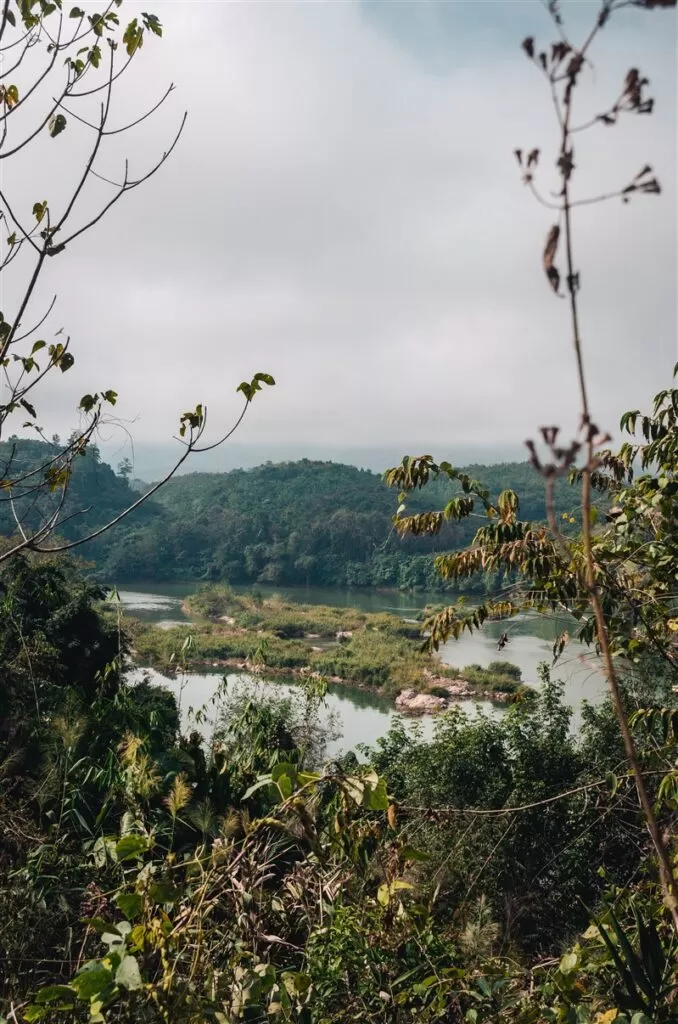
Nam Ou river
Kayaking in Muang Ngoi is the best mode of transport if you want to explore the small beaches at the Nam Ou river. There are even small islands in the middle of the river where you can make a stop.
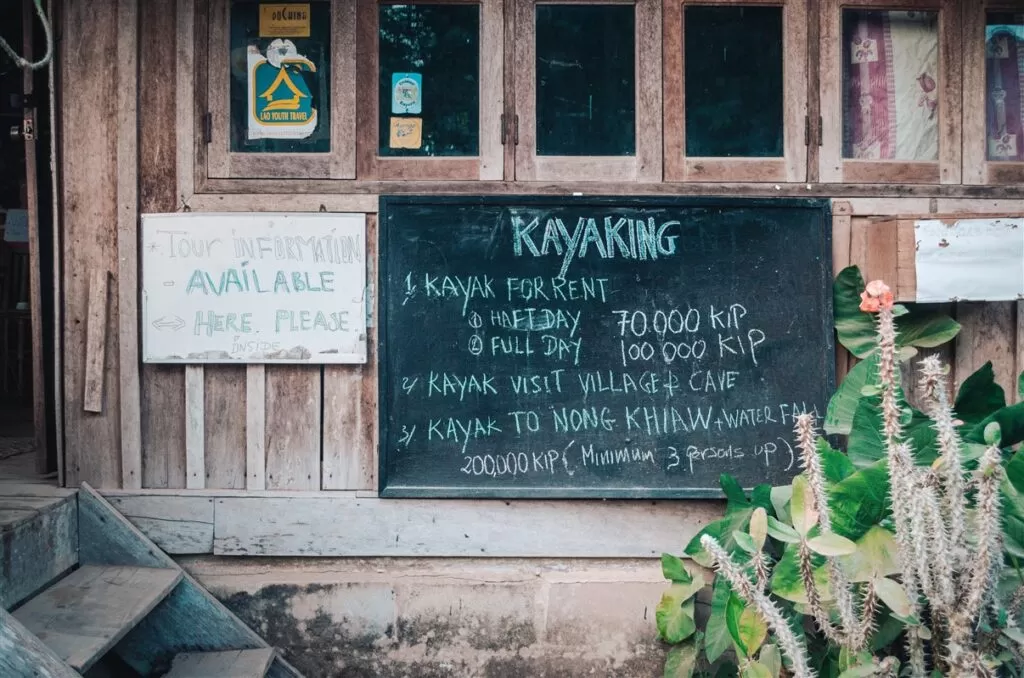
Price for kayaking
Do note that it’s not possible to go very far out with a kayak unless you have very strong arm muscles. You can sail downstream but be aware that the current is very strong when you need to peddle back. In the other direction, you can only kayak for 600 meters. After that, there are rapids that are impassable with a kayak.
A great activity however is to rent a kayak in Muang Ngoi and peddle all the way to back Nong Khiaw instead of taking the passenger boat.
Here are the websites I personally use whenever I travel to Laos:
Booking.com: For the best cheap guesthouses, homestays or small hotels
Hostelworld: To find the best hostels located in the cities
Homestay: For a unique immersive homestay experience in Luang Prabang
12GO and Bookaway: The best transport websites for long-distance buses and train travel in Laos
Loca: Uber and Grab don’t operate in Laos but Vientiane has its own ride-hailing app called Loca!
Skyscanner: For affordable flights to Vientiane or Luang Prabang
Viator and Get Your Guide: book all kinds of activities from a Kuang Si waterfall cruise to a private cave and jungle trekking in Vang Vieng!
Get your Visa for Laos online through the Evisa website. Do note that you cannot enter just any border with the Evisa. You can fly with an Evisa into Vientiane, Luang Prabang, and Pakse and cross three borders with Thailand. They don’t accept the Evisa when you want to cross a land border coming from Vietnam, Cambodia, or China. It’s best to contact the Laotian embassies in these countries to obtain a visa.
If you’re looking for travel insurance, the one with the best benefits online is without a doubt Heymondo! It’s very easy to ask for a quote on the website and if you book with this link you’ll get 5% off!
Get access to mobile data straight away when entering the country with a Laos E-sim or an Asialink E-sim when traveling through multiple countries.
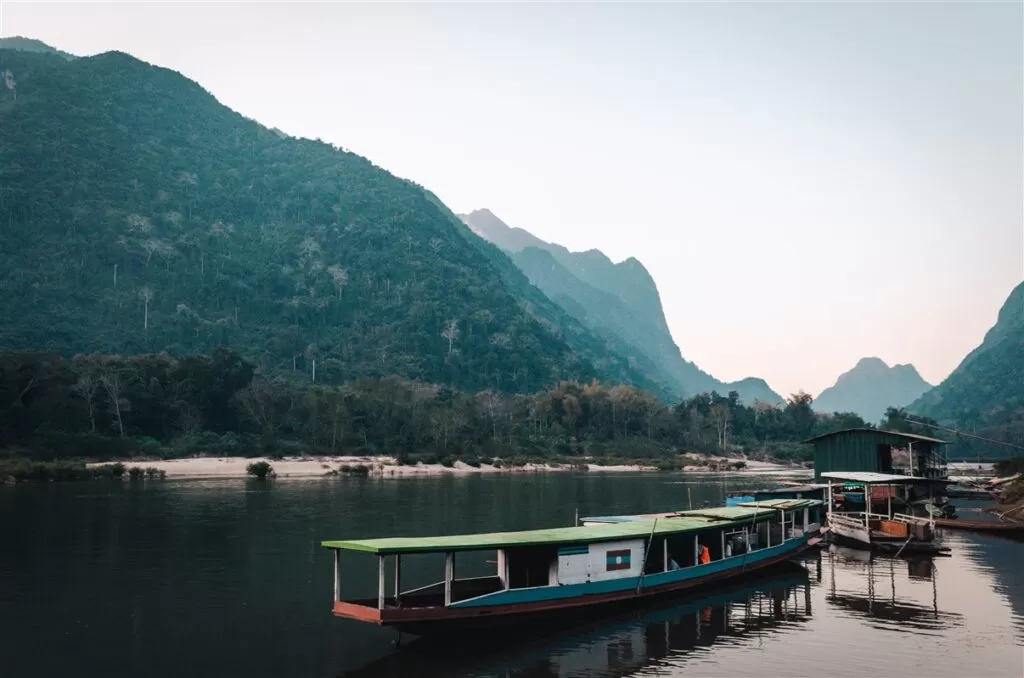
Boats in Muang Ngoi, Laos
There’s only one way to reach Muang Ngoi and that is by taking a local boat from Nong Khiaw. No matter if you’re coming from Luang Prabang, Luang Namtha or Muanghua, you will always have to change from a bus to this boat in Nong Khiaw.
Passenger boats leave at the Nong Khiaw pier every day at 11.30 A.M. In high season there’s a second departure at 2.30 P.M. A one-way ticket costs 50 000 kips and it takes one hour to get to Muang Ngoi.
Alternatively, you can also try to get to Muang Ngoi by the road that passes next to the Nam Ou River. Do note that it is a dusty sand road with a lot of holes and just before you arrive in Muang Ngoi you will need to cross a river. The bridge I took is not suitable to be crossed by motorbike but I believe there’s another bridge that maybe is.
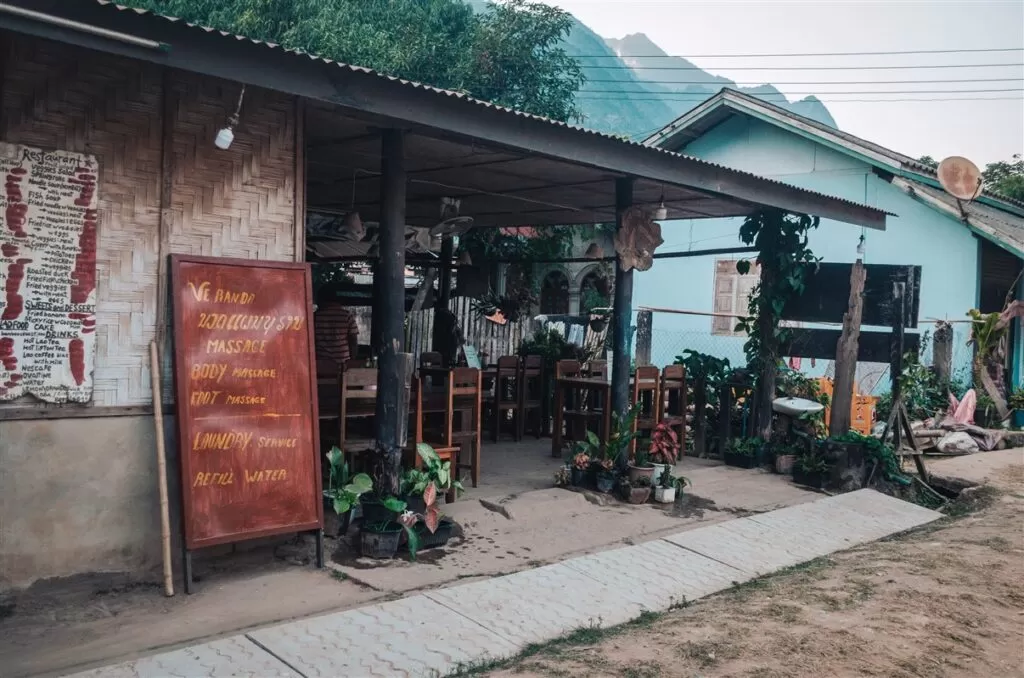
Veranda guesthouse, Muang Ngoi, Laos
As said before, where you sleep in Muang Ngoi can make or break your trip. The accommodation options below are places I recommend because I’ve visited them myself to see how the rooms looked and what the prices were that were being charged. I believe that these places are owned by genuinely friendly Laotions that don’t just see you as a money machine.
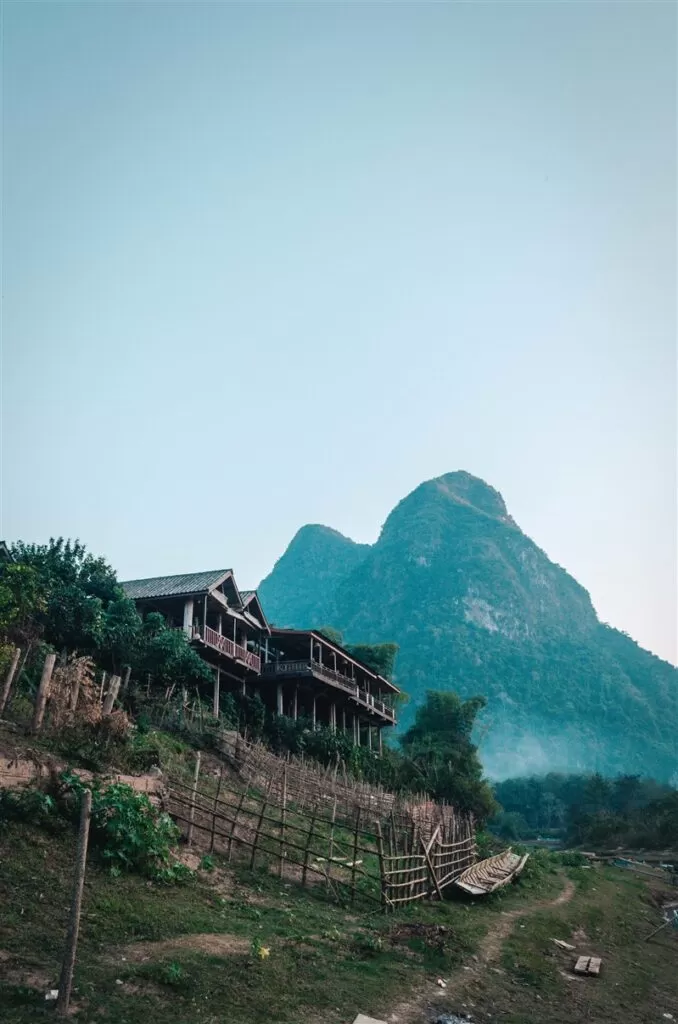
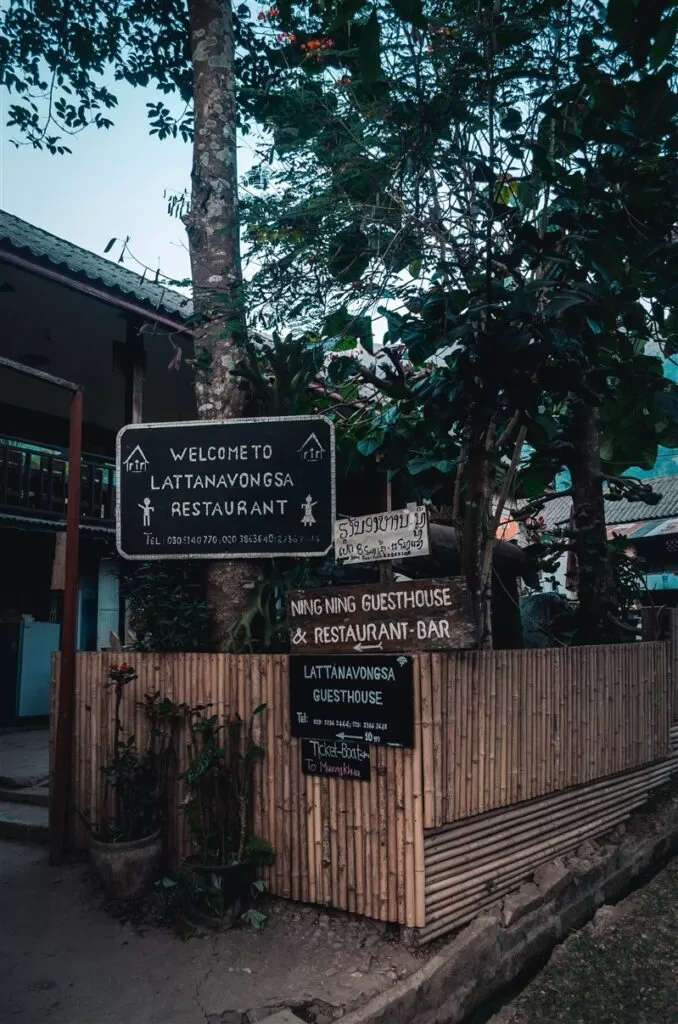
Accommodation in Muang Ngoi, Laos
One thing I also noticed is that, at certain accommodations, prices asked can differ greatly from what other travelers are asked to pay. In my opinion, a lot of the places that are not on any booking platforms, charge what they feel like that day.
Also, note that almost none of the accommodations in Muang Ngoi have aircon or a steady internet connection. Here are my recommendations for Muang Ngoi.
→ PRO TIP: Read my complete packing list for Laos for conscious travelers!
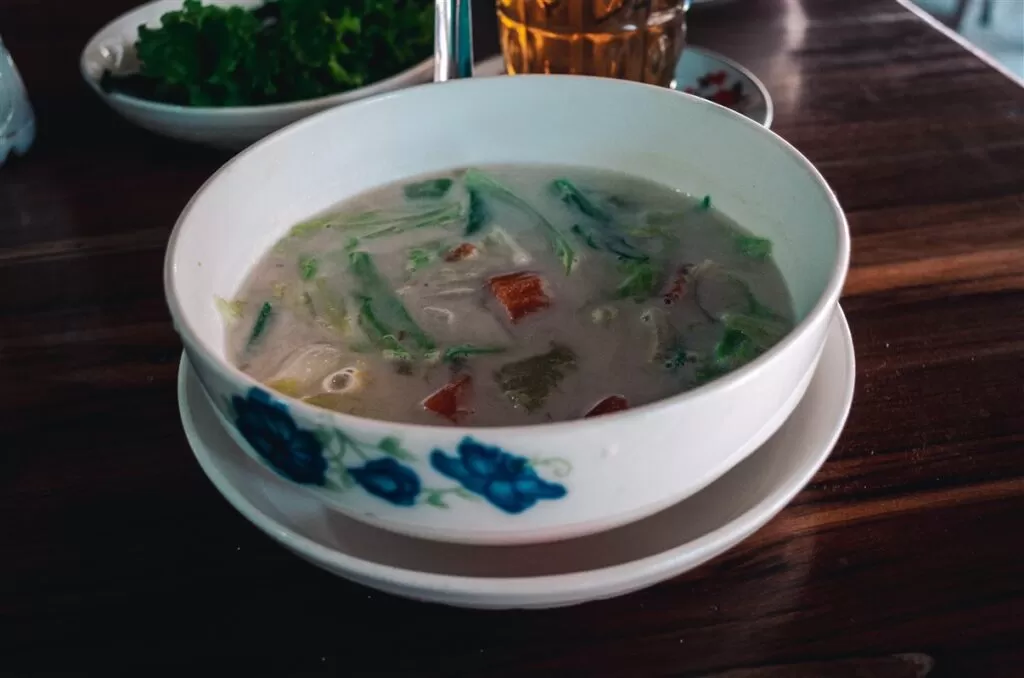
Suzy, a local coconut soup
There are many restaurants in Muang Ngoi considering the small size of the town. At most of them, the prices are significantly higher than what you would expect in a small Laotian town far away in the countryside.
Here are my two favorite places to eat in Muang Ngoi:
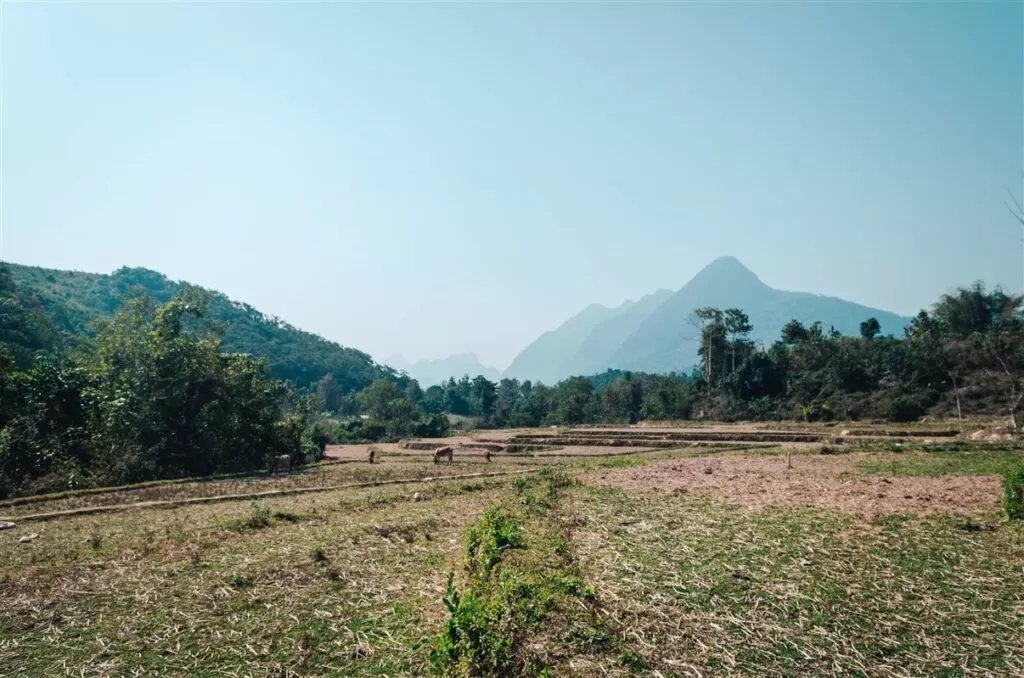
Landscapes around Muang Ngoi Neua
The best time to visit Muang Ngoi Neau is from November up until March. Outside of these moths, it can get very hot and especially very wet. The north of Laos can receive up to 600 milliliters of water per square meter in July and August.
I visited Muang Ngoi in January and the weather was perfect for hiking. During the day time, the temperature was hovering around a pleasant 25 degrees Celsius, and in the evenings it quickly cooled down to 15 degrees or even less.
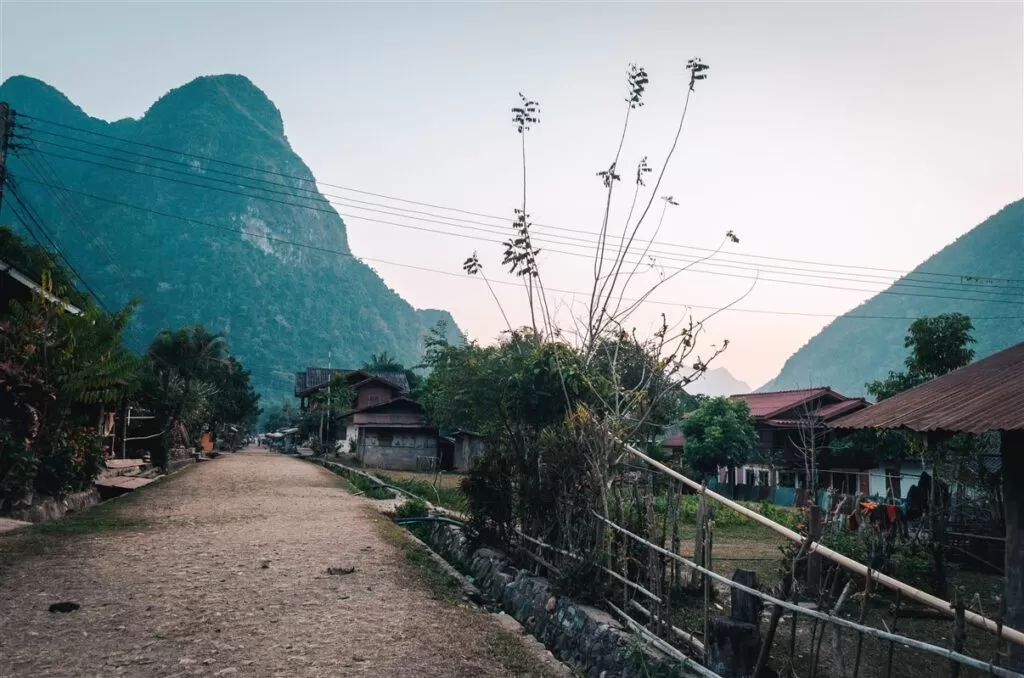
Muang Ngoi Neua
As you can see, you don’t have to wonder about what to do in Muang Ngoi. Muang Ngoi is a lovely small Laotian town full of incredible natural wonders, great hiking opportunities, and delicious food.
When you are planning your trip, make sure to take advantage of all this area has to offer but do it consciously. With the right accommodations, activities, and restaurants, your time in Muang Ngoi Neua is sure to be an amazing and memorable experience.
Let me know in the comments below if you have any questions or drop me a message through my contact page.
Also, don’t forget to check out my resources page with my favorite booking platforms and tips to start planning your trip. Additionally, have a look at my favorite travel gear if you want to pack more consciously!
ENJOY!
Disclaimer: This post may include affiliate links. If you click on them, I may receive a commission at no extra cost to you.
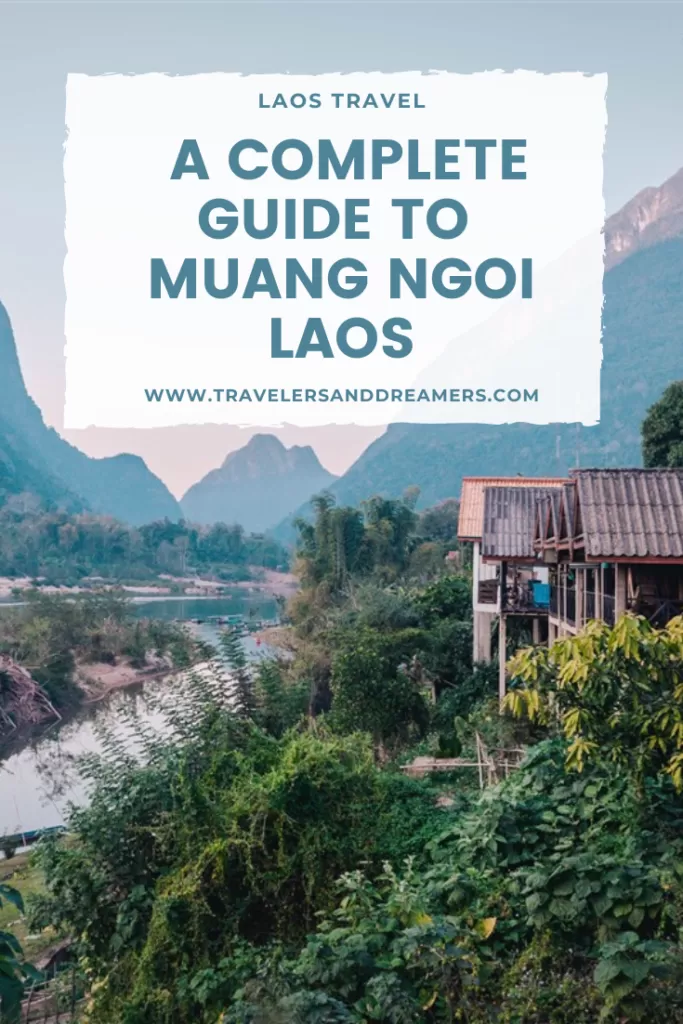
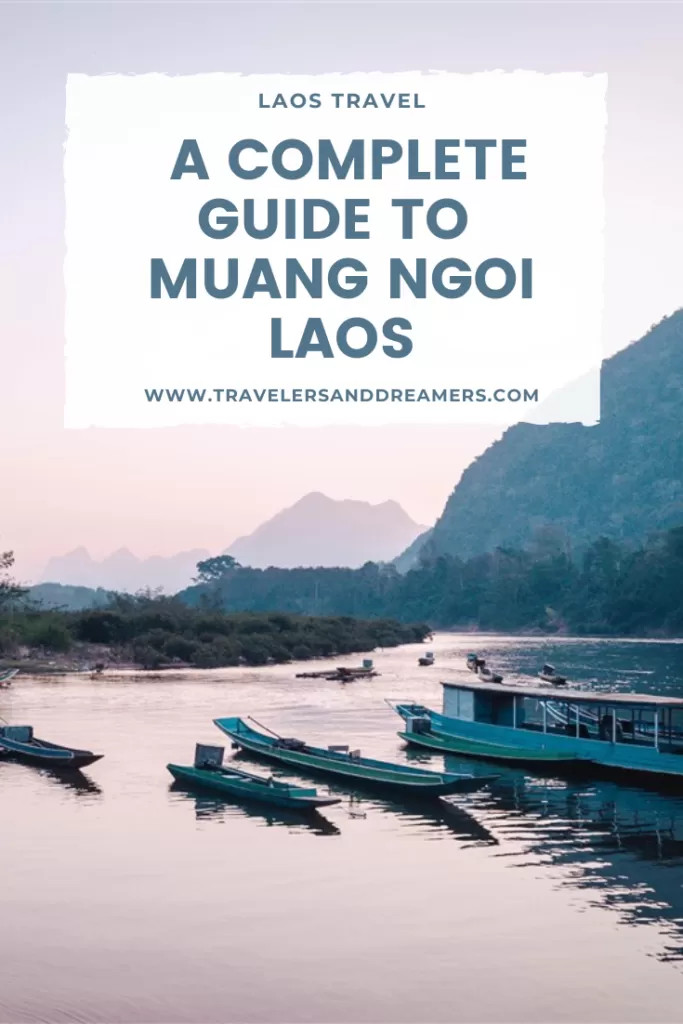

Hi! I am Annelies and this is Travelers & Dreamers, a blog about conscious travel which means traveling in a more mindful way, with a positive impact on the world and yourself!
On this website, I cover different topics like slow travel, plant-based food guides, responsible travel, sustainable packing, eco-travel, and more!
Latest Posts

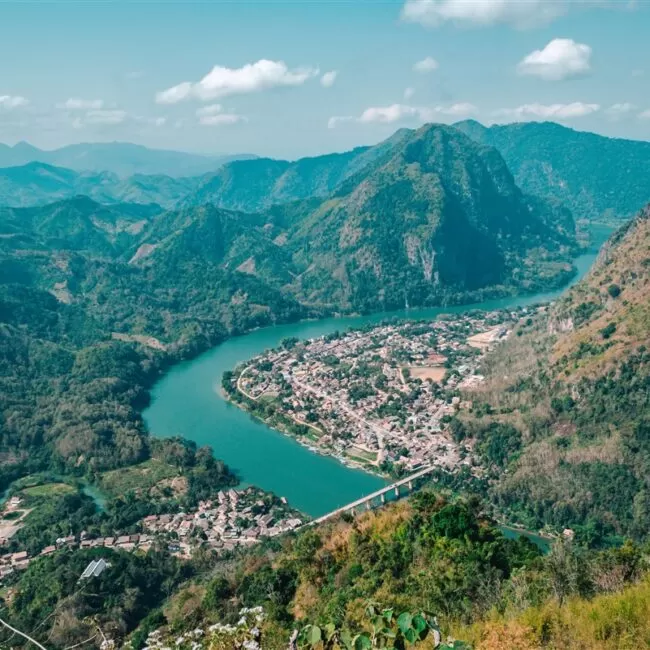
15 Best Things to Do in Nong Khiaw, Laos (2024)
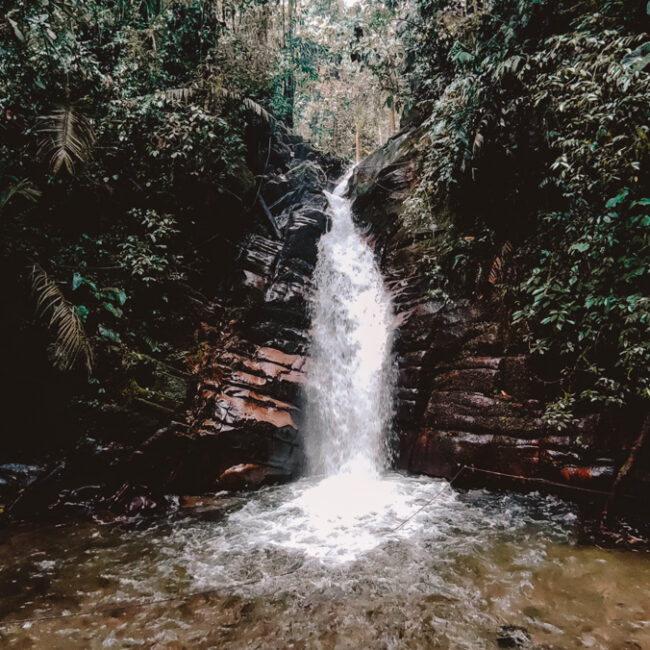
Santa Rita, Salento: All You Need to Know
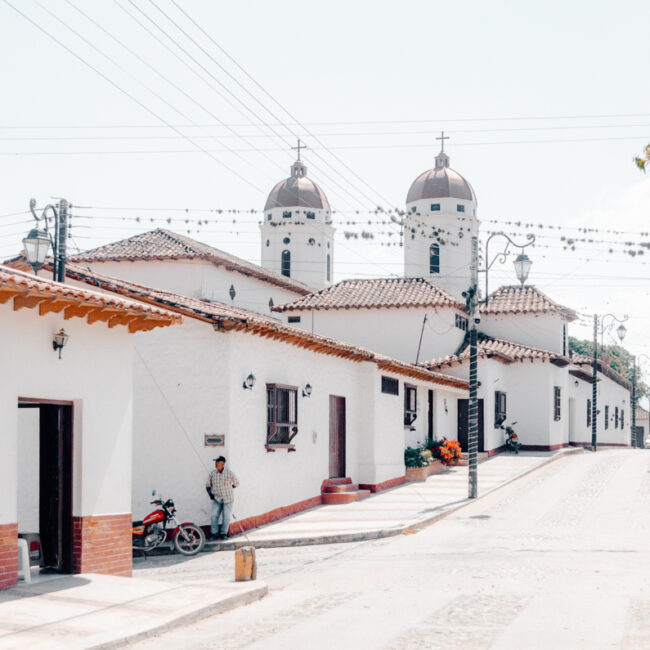
La Playa de Belen, Colombia: An Easy Travel guide!
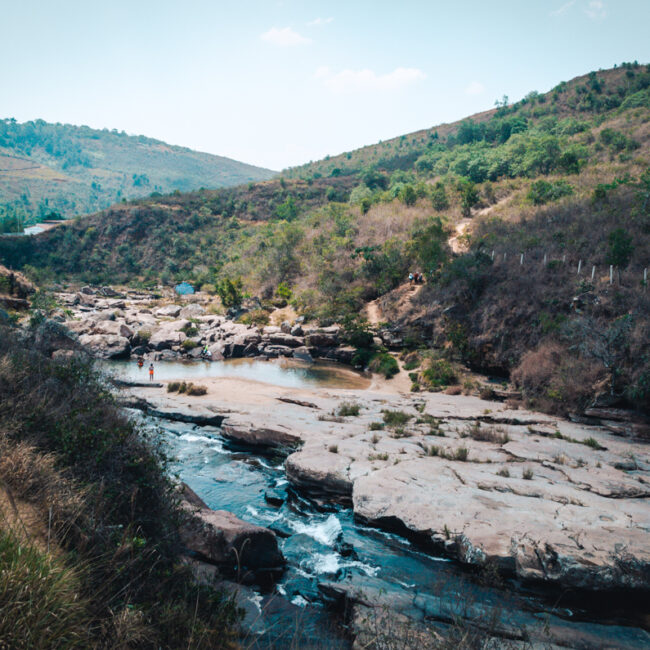
How to Visit the Pescaderito in Curiti (Near San Gil)
Do you want to receive my latest finds on conscious and sustainable travel directly to your inbox? Subscribe here!
© COPYRIGHT TRAVELERS&DREAMERS, 2023.